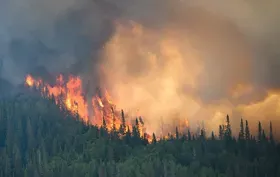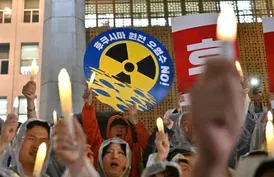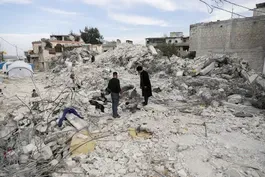
The significance of India's landing on the moon’s south pole
Clip: 8/23/2023 | 6m 15sVideo has Closed Captions
The significance of India's successful landing on the moon’s south pole
It was a historic day for India as it became the fourth country to land on the moon. It comes after a failed attempt in 2019 and just days behind a failed Russian lunar landing. Prime Minister Modi watched alongside the team at the Indian Space Research Organization as the Chandrayaan-3 touched down in the moon’s south polar region. Amna Nawaz and Miles O'Brien discussed the monumental moment.
Problems with Closed Captions? Closed Captioning Feedback
Problems with Closed Captions? Closed Captioning Feedback
Major corporate funding for the PBS News Hour is provided by BDO, BNSF, Consumer Cellular, American Cruise Lines, and Raymond James. Funding for the PBS NewsHour Weekend is provided by...

The significance of India's landing on the moon’s south pole
Clip: 8/23/2023 | 6m 15sVideo has Closed Captions
It was a historic day for India as it became the fourth country to land on the moon. It comes after a failed attempt in 2019 and just days behind a failed Russian lunar landing. Prime Minister Modi watched alongside the team at the Indian Space Research Organization as the Chandrayaan-3 touched down in the moon’s south polar region. Amna Nawaz and Miles O'Brien discussed the monumental moment.
Problems with Closed Captions? Closed Captioning Feedback
How to Watch PBS News Hour
PBS News Hour is available to stream on pbs.org and the free PBS App, available on iPhone, Apple TV, Android TV, Android smartphones, Amazon Fire TV, Amazon Fire Tablet, Roku, Samsung Smart TV, and Vizio.
Providing Support for PBS.org
Learn Moreabout PBS online sponsorshipAMNA NAWAZ: It's been an historic day for India, as it became the fourth country to land on the moon, after a failed attempt in 2019 and just days after a failed Russian lunar landing.
India's Prime Minister Narendra Modi watched alongside the team at the Indian Space Research Organization as the Chandrayaan-3 touched down in the moon's south polar region.
NARENDRA MODI, Indian Prime Minister: This success belongs to all of humanity.
I'm confident that all countries in the world, including those from the global South, are capable of achieving such feats.
AMNA NAWAZ: Joining me now to discuss this monumental moment is science correspondent Miles O'Brien.
Hey, Miles, good to see you.
MILES O'BRIEN: Good to see you, Amna.
AMNA NAWAZ: So tell us about this Indian mission.
What are its goals?
MILES O'BRIEN: Well, its primary goal has been accomplished.
The Indian Space Research Organization wanted to prove it could land a lander softly at the south pole of the moon.
No nation has ever done this.
India becomes the fourth nation to land on the moon anywhere, but the first at the south pole of the moon.
So it's already accomplished its minimal mission goal.
Now we're waiting for the tiny rover Pragyan, which weighs about as much as a checked-on bag, to roll off the ramp of the Vikram lander and spend a little bit of time surveying the Martian surface at the south pole, conducting experiments to understand its elemental composition, its seismicity.
And the biggie here, Amna, is ice water.
The more we know about what the situation is there for water at the south pole, the more scientists get interested in this place.
AMNA NAWAZ: So, as we mentioned, the Russians tried earlier and failed.
They wanted to beat the Indians to make it to the moon.
But what happened to that Russian attempt?> What went wrong?
MILES O'BRIEN: Well, this is a bit of a tortoise and hare.
The Russians launched much later on sort of a beeline mission to the moon.
The Indian space program takes a much more fuel-efficient and generally efficient approach.
Their launch was more than a month ago, and they slowly, but surely nudge their orbit closer and closer to the moon to save fuel, to save way, to save cost.
The Russians tried to sprint.
We don't know exactly what happened.
But as it descended and tried to reach the surface of the moon, something went wrong.
And it made yet another crater in the moon, as if it needed that.
It's probably a reflection of the financial stresses that the Russian space program faces, certainly in the wake of the Ukraine invasion.
But, even before that, it had lost a lot of its commercial space enterprise and business to the lights of SpaceX.
So the Russian program is a shell of what it once was, for sure.
AMNA NAWAZ: So, Miles, tell us a little more about why the south pole of the moon in particular seems to be attracting more visitors now.
And is this what's basically fueling sort of a moon race 2.0?
MILES O'BRIEN: Yes, it's kind of fun to watch.
It's very different this go-round.
It is interesting that, in 2009, the Chandrayaan-1, which was a moon orbiter, carried an instrument built by NASA, which made the first discovery of water ice at the south pole of the moon.
And that has set off quite a race, because it changes the way you think about possibly operating an outpost on the moon.
If you have water, you have H2O, you can certainly sustain life, obviously.
But you can also create electrical energy, and H and O are actually rocket fuel.
So you could conceivably fuel up rockets to go back to Earth, or perhaps even go farther beyond.
So, with all that in mind, people who want to explore space find this an intriguing spot as a launching pad, if you will.
AMNA NAWAZ: Miles, some of this is certainly about national prestige, right?
It certainly was for the U.S.
So what does it do for a country when they're able to do this?
And also tell us about America's efforts to return to the moon.
MILES O'BRIEN: Yes, I mean, I think you could make an argument that to attain a superpower status, having a space program is part of the whole mix.
And I think that is something that India has discovered and has made a huge investment really in the past three years too.
It has unleashed private enterprise.
And there are now about 140 small space start-ups in India attracting several hundred million dollars in investment.
So what India has discovered is that not only does it give you that soft power prestige throughout the world.
Space is a huge wealth generator.
And as things get smaller and cheaper in space, you can imagine using space to provide great value to people out here on Earth, not just to go and plant a flag on Mars, but to help farmers plant crops better, to understand climate change, to better understand our weather patterns.
And so all of that makes it a practical thing, but also a symbolic and, well, boasting rights kind of thing for nations.
And I think India has discovered that, along with China, the U.S. and, of course, the Soviet Union initially.
AMNA NAWAZ: Miles, I got to ask, because you cover all these details of all these different efforts, but seeing something like this, does it ever get old?
MILES O'BRIEN: No.
No.
This is so exciting to see a new generation of people and a new group of people succeeding in this realm.
And to see India ascendant and succeed so well, it heartens those of us who care about space exploration.
Truly, the more the merrier.
And nobody is enjoying any moment of schadenfreude over the Russian failure.
The more that the U.S. and its other -- and other spacefaring nations succeed, the more the Earth as a whole does better by using space as a tool to make life better here.
AMNA NAWAZ: Science correspondent Miles O'Brien, thank you so much.
Always great to see you.
MILES O'BRIEN: You're welcome, Amna.
Canada struggles to combat devastating wildfires
Video has Closed Captions
Clip: 8/23/2023 | 3m 2s | More than 37 million acres burned as Canada struggles to combat devastating wildfires (3m 2s)
How alleged death of Prigozhin impacts Russia's stability
Video has Closed Captions
Clip: 8/23/2023 | 9m 46s | How the suspected death of Prigozhin could impact Russia's stability (9m 46s)
A look at Japan's plan to release Fukushima's water into sea
Video has Closed Captions
Clip: 8/23/2023 | 8m 34s | A look at the plan to release Fukushima's treated radioactive water into the sea (8m 34s)
Northwest Syria faces slow recovery after earthquake
Video has Closed Captions
Clip: 8/23/2023 | 8m 38s | Northwest Syria faces slow recovery 6 months after devastating earthquake (8m 38s)
What to expect as GOP candidates debate without Trump
Video has Closed Captions
Clip: 8/23/2023 | 5m 14s | What to expect as GOP presidential candidates debate without Trump (5m 14s)
Who will benefit from the new plan to relieve student debt
Video has Closed Captions
Clip: 8/23/2023 | 5m 59s | Who could benefit from the Biden administration's latest plan to relieve student debt (5m 59s)
Providing Support for PBS.org
Learn Moreabout PBS online sponsorshipSupport for PBS provided by:
Major corporate funding for the PBS News Hour is provided by BDO, BNSF, Consumer Cellular, American Cruise Lines, and Raymond James. Funding for the PBS NewsHour Weekend is provided by...

















